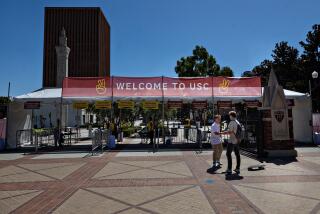Senate Panel Backs Plan to Finance Campus
The push to transform Camarillo State Hospital into a four-year college cleared another crucial hurdle Wednesday as a key Senate panel endorsed a bill aimed at raising the cash needed to build the budding Cal State campus.
In contrast to an April 1 hearing where members of the local government committee picked apart the innovative financing scheme, those same lawmakers took only a few minutes this time to approve the bill and nudge it along in the legislative process.
“This is big, especially in light of the setback we suffered two weeks ago,” said state Sen. Jack O’Connell (D-San Luis Obispo), who wrote the bill. “It was like pulling a rabbit out of a hat. We worked hard over the past two weeks to put together this effort to win the vote.”
With local government agencies, Cal State University planners have crafted legislation to create a special authority to serve as landlord for the fledgling campus. The seven-member authority would include four CSU trustees, two county supervisors and a representative from one of the county’s 10 cities.
It would manage all financial aspects of the former hospital site--raising revenues from property and sales taxes, selling bonds and providing tax incentives to lure private and public ventures to the property.
The authority is not needed to launch the inaugural phase of the campus, as lawmakers already have earmarked $16.5 million to convert the shuttered mental hospital into the new home of the Ventura campus of Cal State Northridge.
Rather, it will be used to generate the $25 million to $50 million needed to expand the Northridge center into a full-fledged university, a 23rd campus in the CSU system to be called Cal State Channel Islands.
But lawmakers tore into the financing plan when it made its debut earlier this month, demanding more detail about the proposal.
Specifically, committee members worried about the level of commercial development that would be needed to expand and support the campus and questioned the wisdom of local political leaders who have agreed to forgo all taxes generated at the site until well into the next century.
To counter that criticism, Cal State planners set out to rally support for the legislation.
They arranged a series of meetings with key lawmakers, even persuading two Senators--Stockton Democrat Patrick Johnston and Los Angeles Democrat Richard Polanco--to co-author the legislation.
In addition, two dozen university boosters were on hand Wednesday to urge lawmakers to endorse the bill, a key component to transforming the aging hospital property into a modern-day college campus.
They never got a chance to speak, as legislators quickly endorsed the proposal and pushed it to the Senate’s revenue and tax committee.
“I think we did good homework, we had good discussions and it clarified a lot of the issues that people had,” said Handel Evans, president of the developing Channel Islands campus. “We tend to forget how complicated this is. If you’ve been with it from the very beginning, you tend to forget that people coming in cold need some time to soak it in.”
The proposed authority would be unique to state government and a potential model for university development, officials say.
The CSU governing board has made it clear that the Ventura County campus will grow only if it finds a way to generate the cash needed to make that happen. Toward that end, planners are hammering out ways to create a commercial hub and establish a range of other money-making ventures to help the college pay its own way.
That is where the authority plays its most vital role, serving as an economic engine to fuel development and pump out a steady stream of cash to support university projects.
Potential projects include creation of a senior citizen community, a high-tech business park and 900 units of residential housing for students, faculty and staff.
“I believe this is a breakthrough in terms of higher education funding,” Evans said. “This is more than pushing the envelope. It is unique and really quite exciting.”
More to Read
Sign up for Essential California
The most important California stories and recommendations in your inbox every morning.
You may occasionally receive promotional content from the Los Angeles Times.










